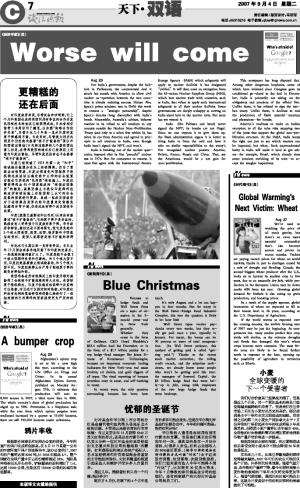Aug 23
For India's government, despite the hubbub in Parliament, the controversial deal it struck last month with America to allow civil nuclear co-operation between the two countries is already radiating success. Shinzo Abe, Japan's prime minister, was in Delhi this week to cement a “strategic partnership”, despite Japan's decades-long discomfort with India's bomb. Meanwhile, Australia's cabinet, hitherto resolute in its refusal to sell uranium to any country outside the Nuclear Non-Proliferation Treaty (and only to a select few within it), has taken its cue from America and agreed in principle to sell uranium to India, even though India hasn't signed the NPT, and won't.
India is breaking out of the nuclear quarantine imposed after its first “peaceful” nuclear test in 1974. But for commerce to resume, it must first agree with the International Atomic Energy Agency (IAEA) which safeguards will apply to nuclear facilities it has designated “civilian”. It will then need an exemption from the 45-nation Nuclear Suppliers Group (NSG), which bars nuclear trade with countries, such as India, that refuse to apply such international safeguards to all their nuclear facilities. Some governments are deeply unhappy at carving an India-sized hole in the nuclear rules. But none has yet vetoed it.
India (like Pakistan and Israel) never signed the NPT; its bombs are not illegal. Since no one expects it to give them up, the Bush administration argues it is better to bring India in from the cold and have it take on similar responsibilities to the treaty's five recognised nuclear powers: America, Britain, France, Russia and China. That, say the Americans, would be a net gain for non-proliferation.
This newspaper has long disputed that. Among other dangerous loopholes, some of which have widened since Congress gave its conditional go-ahead to the deal in December, India is pointedly not taking on the obligations and practices of the official five. Unlike them, it has refused to sign the test-ban treaty. Unlike them, it declines to end the production of fissile material—uranium and plutonium—for bombs.
America's readiness to make an Indian exception to all the rules risks snapping two of the joists that support the global non-proliferation structure. At the IAEA, India wants the right not just to say which reactors can be inspected, but when. Such unprecedented laxity in India will make it hard to get others—for example, Brazil, which already does some uranium enriching of its own—to accept the tougher inspections.

